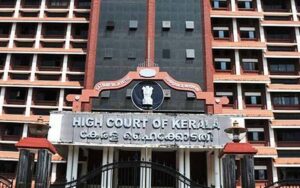Landmark Judgement by Kerala High Court stating ICAI cannot interfere in dispute between Partner of CA Firm

Kerala High Court has passed the above judgement in case of Joshi John (petitioner) V. The Institute of Chartered Accountants of INDIA (ICAI) (1st respondent), Anitha C. Shenoy (2nd respondent) and Girija P.K. (3rd respondent) vide it’s Judgement Dated 26.04.2021.
The above case was filed vide a writ petition by Joshi John and the facts of the case are as under:(6)
Joshi John was a partner of a partnership firm of Chartered Accountant named R Menon and Associates wherein he was the working partner and managing the office of the partnership firm having office at Ernakulam whereas other two partners as mentioned above were even practicing individually or doing other work.
The husband of 3rd respondent, was landlord of the premises from where the firm was being operated, and he had issued notice to the petitioner to vacate the partnership office premises. On such notice the other two partner’s agreed to the demand and vacated the office.
The petitioner who had built that space and made a name for the firm was at loss because of this decision and decided not to continue such partnership and wanted to dissolve it and same was communicated to the other partners.
However, the other two partners told that he cannot unilaterally dissolve such partnership, but can retire the partnership and other two partners will reconstitute the firm.
The petitioner filed an application with ICAI to dissolve the firm but same could not be done because to dissolve the firm OTP from other two partners also needs to be entered.
Petitioner still wanted to practice as a CA and tried to register his concern at a different address but the ICAI portal refused him to register his firm because he was already incharge of another partnership firm and as per regulation of ICAI a person cannot be in-charge of two firms registered at two different address.
Considering the above difficulties court had passed an interim order to allow petitioner to register his concern and ICAI should accept his Form 18.
Although ICAI had accepted his Form 18 but as per ICAI regulation if there is a dispute between partners of any firm, it needs to inform the same to C&AG and RBI as well and because of which petitioner was not able to empanel himself and get audit assignments.
Earlier respondent 2 and 3 had agreed to take retirement of petitioner but when they were in court they disagreed to same and said the same could only be done after partnership has been valued till date and everything is settled because the petitioner was taking clients.
Now ICAI said that as per it’s Councils 300th meeting it was held that where firm is “at will” retirement or reconstitution cannot be permitted if there is a dispute between the partners.
High Court’s observation and judgement:
In the above case High court had studied Regulations of ICAI wherein it had stated that as per Chartered Accountants Act, ICAI had to only maintain register of members and does not maintain register of firms and as such there is no provision for registration of partnership firm with ICAI.
The Regulation only requires that a Chartered Accountant in practice or a Firm of such Chartered Accountants shall, before commencement of practice in a trade name or Firm name apply to the Council for approval to
use a trade or Firm name.
The regulation 190(6) requires to the firm to inform council about change in firm if any ICAI shall maintain register of offices and firms.
Council of ICAI had taken a decision that if there is a dispute among the partners, regarding retirement, the retirement will not be noted by the Institute.
Now although petitioner had registered his firm because of court’s interim order but because of the dispute he was not actually allowed to practice.
High court said that since there is no requirement for partnership firm to register with ICAI the partnership firm like any other partnership will be governed by Partnership act, 1932.
As per Partnership Act, 1932 where partnership is “at will” as is in the present case, the firm may be dissolved by any partner giving notice in writing to all the other partners of his intention to dissolve the firm also in case of retirement it is enough for the retiring partner to just inform the other partners about his retirement.
It was also observed that as of now Chartered Accountants Act does not empower the Council to adjudicate
inter se dispute between members of the Institute or disputes between partner-members of a Firm, unless those disputes fall within the ambit of Chapter V of the Act, 1949.
Thus, some important principles laid down by High court were that ICAI had no power to interfere in the dispute between the partners of a CA partnership firm or retirement of partner.
High court also noted that such non recognition of retirement were outside the powers of ICAI and were having adverse impact on the practice of petitioner and was against fundamental right of the petitioner to practice a profession freely, guaranteed to him under Article 19(1)(g) of the Constitution of India.
Hence, the High Court allowed the writ of the petitioner and allowed dissolution of firm.
To read full judgement CLICK HERE.
From the above judgement it is important to note that before getting into partnership firm with anyone it is important to understand the person with whom you are going to work and the terms and conditions of partnership firm and especially for young Chartered Accountants who join partnership firms.